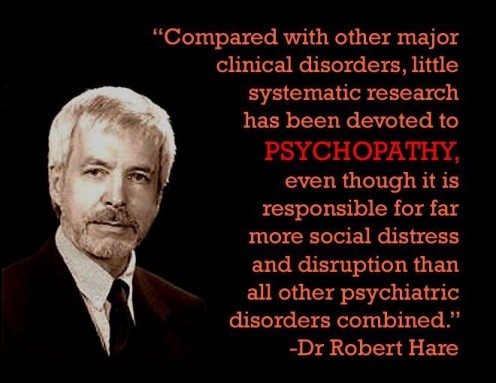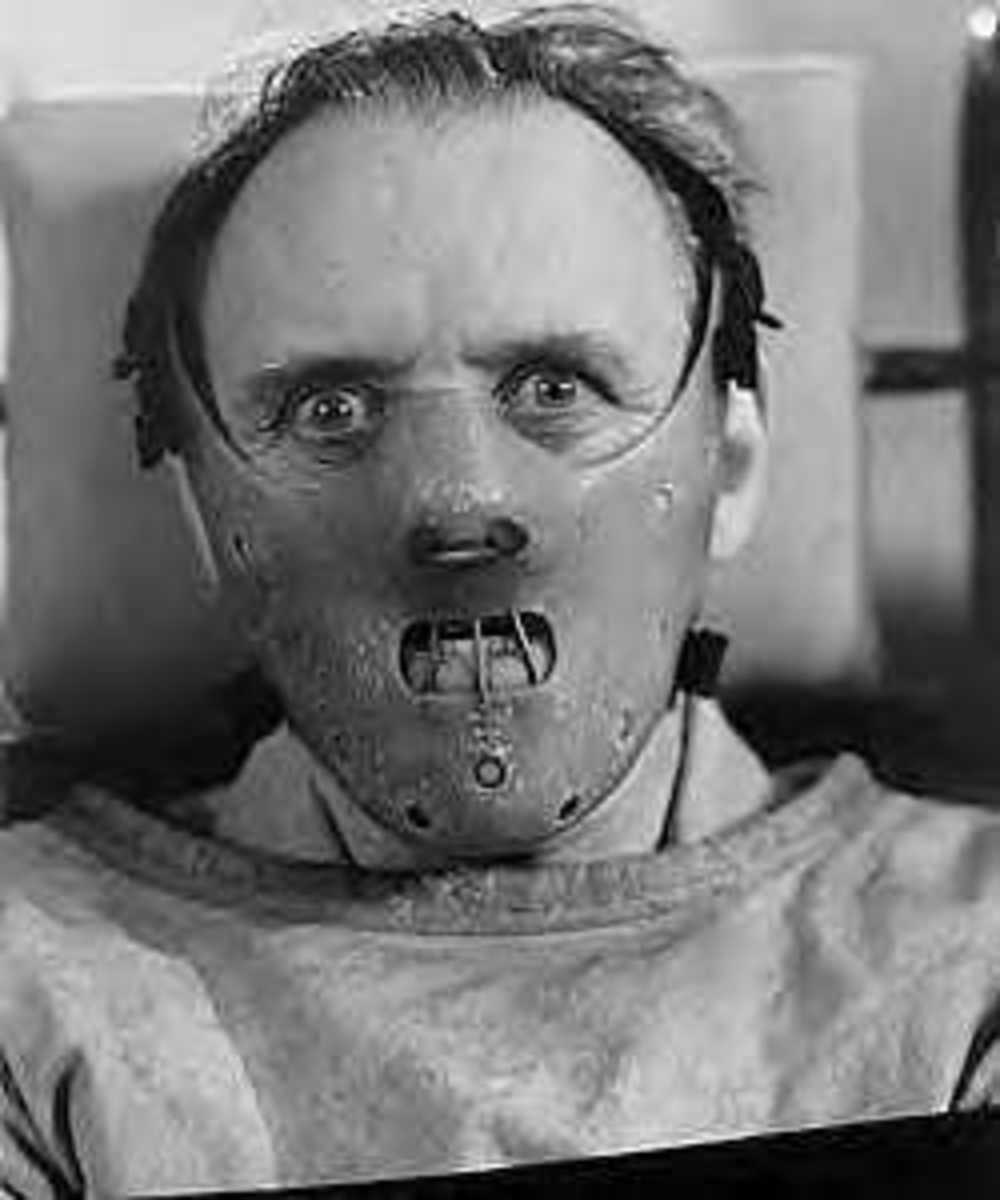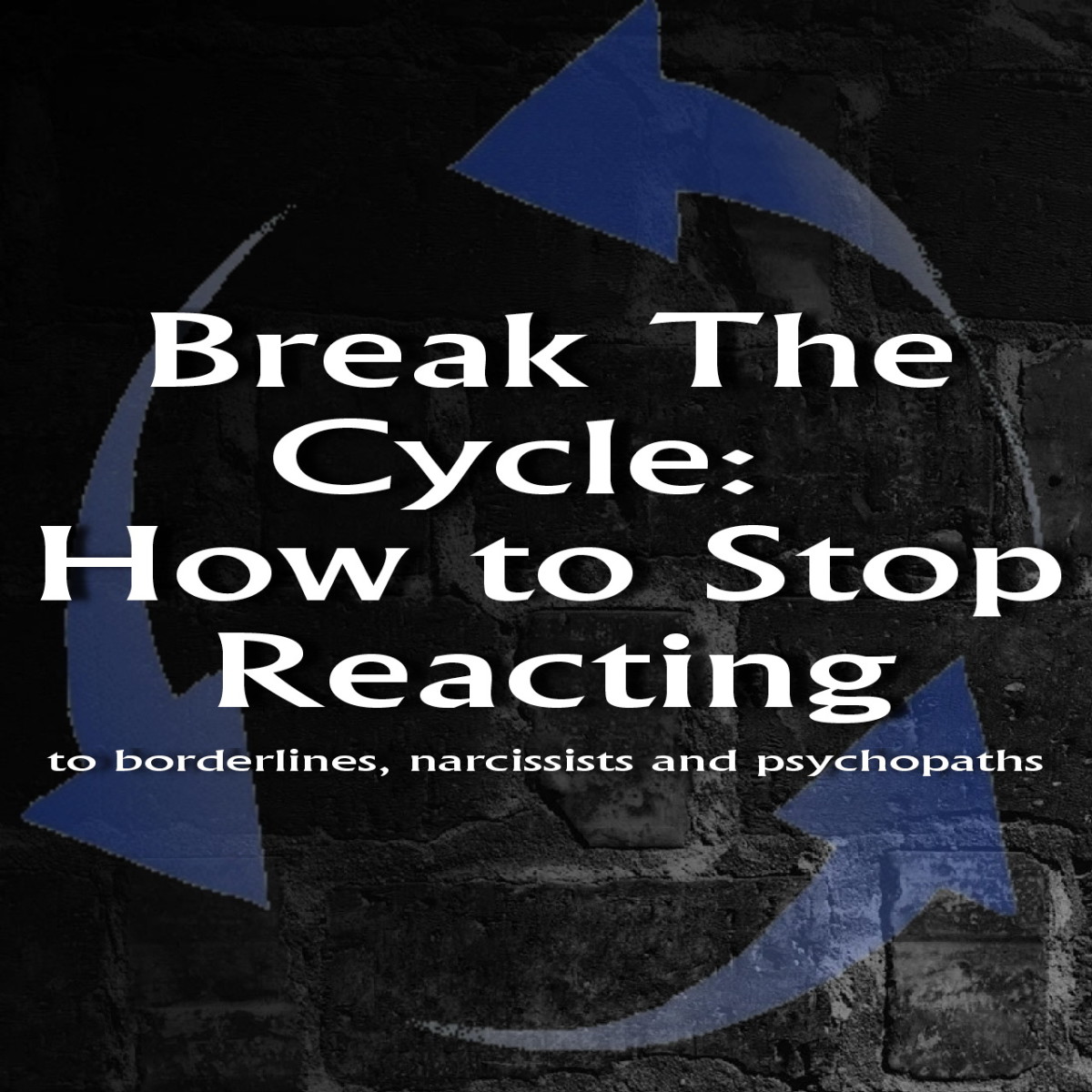Psychopathy
Dr. Robert Hare

What is Psychopathy?
Often associated with Sociopathy, it is a Personality Disorder of antisocial behaviour that lacks empathy and remorse.
American’s, Hervey M. Cleckley, a psychiatrist, and George E. Partridge, a psychologist, were both involved in identifying the criteria for diagnosis.
Over time, since 1801, when certain behavior was noted in individuals they would be diagnosed as having a mental disorder. The defining criteria has changed and evolved, put into more specific traits and therefore a broader spectrum of conditions. Instead of diagnosing an individual as having a mental disorder, they can now narrow it down to diagnosing a person as being a psychopath with or without sociopathic tendencies.
CAUSE
Studies that have been conducted show that psychopathy can be genetic, with aggravating factors such as the environment.
GENETIC and ENVIRONMENTAL - Psychopathy along with other mental disorders are moderately genetic and therefore can influence the development of psychopathy, while environmental factors tend to determine the traits. The traits that are generally inherited are in the areas of being insensitive, detached, dominance, unemotional, varying uncontrollable impulses; there is also an increased risk of aggression and antisocial behavior.
While the environmental factors determine what traits develop, such as being grandiose, manipulating/influencing traits, as well as being violent and aggressive without any feelings of guilt.
ENVIRONMENTAL- This section has much to do with the upbringing of the individual, and factors that are common among psychopaths; While these vary and appear to contradict one another, the studies conclude that the following are environmental factors.
1.) Physical neglect - which can be abandonment, inattention, withholding proper care, and lack of supervision;
2.) Low involvement from the father with his son, having a parent who is in jail or in prison;
3.) Coming from a poor/low income family – this theory is based on the fact that a parent or parents struggling to get by financially and often fight over money and other issues making it a disruptive home environment. This is also true for a single parent households where a single mother or father may be depressed, unable to provide proper supervision if he or she is working and/or depressed, also being in a low social class where poor housing is likely a spilling over factor in financial constraints.
BIOCHEMICAL – This section involves testosterone, serotonin, and cortisol.
TESTOSTERONE - High levels of testosterone combined with low levels of SEROTONIN and cortisol may be associated with response to frustration, such as hostility, anger, and viciousness.
LOW CORTISOL- Cortisol plays a role in where fear, punishment, and backing off or withdrawing are integrated in you. Lack of cortisol would naturally devoid one of those emotions.
HEAD INJURY - Researchers have linked a head injury with psychopathy with the trait being violence, this is when damage to the prefrontal cortex, which includes the orbitofrontal cortex is traumatically injured.
This traumatic brain injury has been associated with an inability to make morally and socially acceptable decisions. Moral decisions involve right and wrong where socially involve the interactions with others.
Children, who have had this type of brain injury, are at high risk of not developing socially and as a result, lack moral reasoning, therefore developing into psychopathic individuals with high aggression and antisocial behavior. They also lack empathy or guilt over anything immoral they have done.
DIAGNOSIS
Psychopathy is accessed with a checklist that was created by Robert Hare. The test is called a PCL-R test. It used as a standard despite numerous criticisms of the test.
The test itself is based on a scoring system, which involves an interview that is done face-to-face, and getting supporting information on the lifetime behavior of the individual. However, it has been done using file information only.
The information that is relevant is
1.) Impulse- instinctive drive, motive, sudden urge
2.) Aggression- a measure of hostile attitude or behavior, generally violence
3.) Measure of empathy – Understanding another persons feelings
4.) Machiavellianism – Cunning and unscrupulous behavior
5.) Criminal behavior that connects a lack of empathy
6.) Narcissism- self-admiration.
7.) Social dominance- Power exerted over others
SCORING – The maximum score is 40 for the cut-off of being diagnosed with having psychopathy. In the United States, the cut off is a score of 30, and in the United Kingdom, the cut off is 25.
Psychopath Test
Signs and Symptoms
This list was created by Hervey Cleckley, who is one of the American’s that were involved in identifying the criteria for Psychopathy. Hervey Cleckley was a Psychiatrist and an author of several books n the subject. This list is complied from his book “The Mask of Sanity”
1.) Superficial charm and good intelligence - surface appeal, shallow, phony
2.) Absence of delusions and other signs of irrational thinking– Moral insanity – where the individual might suffer from a mental disorder in one area, but the intellect of the individual is unimpaired.
3.) Absence of nervousness or psychoneurotic manifestations- Prone to boredom and need for stimulus. Psychopaths don’t generally feel nervous or worry, whereas in same situation, a normal person would be. If a psychopath impatient, it is generally in situations he can’t control, such as being jailed or imprisoned, but those feelings are not the result from any guilt or remorse, it’s from external sources, i.e., doesn’t understand why he’s been jailed or committed to a hospital.
4.) Unreliability - unreliable, total disregard for obligations/commitments no matter the importance or urgency. While they can and do succeed in business, pay their bills and graduate college, but the coin will flip and the irresponsible, destructive and dishonest psychopath will demonstrate their capabilities, with no regard for consequences.
5.) Untruthfulness and insincerity – A psychopath will not tell the truth about the present or the past, or even the future. Where there are typical criteria o distinguish a liar, a psychopath does not show any of those those traits. They appear to be a straightforward person.
6.) Lack of remorse or shame – Deceitful and manipulative – the psychopath is never at fault for any wrong doing, it is always shifted to others, they are very deceptive but are good at gaining the trust of others. A psychopath isn’t capable of having dignity.
7.) Inadequately motivated antisocial behavior- committing crimes such as theft, adultery, forgery, etc. without an apparent goal.
8.) Poor Judgment and failure to learn from experience - Where no punishment is likely to make a psychopath change his or her ways, the same negative behavior, that gets the same negative response, is repeated. Thus many have criminal records.
9.) Pathological egocentricity - Vanity and self-esteem, a self-centeredness that isn’t able to change.
10.) General poverty of major effective reactions - a readiness of expression rather than strength of feeling, weeping appears to be of bitter tears, or speak movingly of misfortunes and sadness. There is a lack of sincerity with emotions.
11.) Specific loss if insight- Instead of facing facts, the psychopath will blame others, when they do take blame for everything, it has no significance to them. There isn’t a capacity to see himself as others see him.
12.) Unresponsiveness on general interpersonal relations- No matter how kind you are to them, how well you treat them, the only appreciation you will get is superficial. Appreciation is cited when it is beneficial to him but that is all it is, cited, it’s not coming from appreciation. To explain, its like a learned behavior, copying or merely regurgitating what should be said, but not believing a word of it or feeling any remorse whatsoever. They are very good at faking emotions.
13.) Fantastic and uninviting behavior with drink and without- behaviors range from vulgarity, domineering rudeness, quick shift in moods, petty truculence (aggressively defiant) or sullenness (hostility silent).
14.) Suicide rarely carried out - While suicidal tendencies have been seen by some observers, it is more likely that the psychopath will work himself into situations that would more likely cause a normal person to end their life. Suicidal threats, the same as promises are empty. Not that they are exempt from bungled attempts to gain something from others.
15.) Sex life impersonal, trivial, and poorly integrated- Abnormal sexual acts due to the inability to not recognize offensive acts. They are prone to many sexual partners because they do not love anyone; further how they go about planning sexual rendezvous lack common sense or reason.
16.) Failure to follow any life plan- doesn’t make any effort to reach a goal, and seems to make more of an effort to make failure. You can place the psychopath in any situation that others would view as a great opportunity for them, but the psychopath will fail to retain any of it and will fail with remarkable and strange behavior, as an intentional act.
Effect on Their Close Relationships
The presence of a psychopath in your life will cause you emotional and psychological harm. They laugh when you are hurt, they are never wrong. They often cheat and will blame you because they did so.
Psychopaths care about themselves and no one else. Be assured if you see tears, they are not genuine, they are learned behavior. They have to learn the acceptable way to act or react by watching others because they do not feel like we do or love. Do not take that to pity them in any real sense, as to believe they WANT to learn, they don't, they only want to know how to look "normal" so that it is easier to scam, abuse and take full advantage of the next person. They use it to manipulate and to get pity when they turn the tables on the last victim and move onto the next with their stories of abuse and being taken advantage of, they can't convince you what an abuser they had to escape, if they can't fake the emotions to convince you and receive your pity.
The victim before you went through hell, probably for many years before breaking free and not allowing himself or herself to believe the "I'll change" stories and finally ended it, which enrages the psychopath because the name of game is winning, manipulation, using, abusing and getting their way...always.
They will come off as intelligent, charming, witty, financially secure, and professionally successful, and if they aren't they will tell you of their hopes and dreams that will sound like they are passionate about saving the world, animals, homelessness, children, etc. They care nothing for those issues or causes, they care about making you believe you have just met the most amazing man or woman of your life. How else can they snare you in? Certainly not by removing the mask, but that will happen once they know you love them and it will hurt you so deeply. They will have spent months telling you how beautiful or handsome you are, how you are such a lovely and wonderful person, and how they have never met anyone they love as much as he or she loves you and when they are confident that you love them too, the mask slips.
At the point, he or she knows that you will not leave them, in a romantic atmosphere or even moment, an insult will come about, it might be telling you that you have gotten fat, your breath stinks, you smell foul and accuse you of not bathing or brushing your teeth with a very disgusted look on his or her face, these insults will be so harsh and so personal you will not tell anyone. The psychopath therefore wins.
You may address these words with them, and they will usually deny saying it and accuse you of starting a fight and they may even say, "I understand you are scared to love again after..." and while you KNOW he or she said it, you will then drop it, you've just been master manipulated.
This pattern will continue with many apologies, there isn't any sincerity though, not in the slightest, and it will escalate to even more hurtful and humiliating times.
The effect on their close relationships is devastating for the victim and therefore it is important to know who you are dating and to also never hide those insults from others who love you because they will help you see exactly what is happening. Compliments, devalue and use until you leave them or they leave you, but not until they have taken all from you they can.
Another noteworthy addition to this is that they have no past, you will not meet anyone from their past because they have stories and he or she will not want you hearing them, not always the case, but most of the time it is. Sometimes you will meet the family and some friends, who are too afraid of him or her to cross them by telling you a thing.
When you want to leave a psychopath, make no fuss, no argument and no debates, just leave and cut off all contact. Change your cell number, home number, address and deactivate your Facebook and make a new one and block him or her on there, and add ONLY friends who are willing to block him or her too. Advise your family and friends that he is abusive, and no matter what he says, he is NEVER to get your contact information, and DO have him or her arrested if they harass you in ANY way. I would even go so far as to inform my local police department of the abuse you have endured, even if it is all emotional and psychological, it is still abuse and tell the police you fear him or her if you do and by then you probably reallly will.
CURE
There is no conventional method to cure psychopathy. Psychopaths do not possess real emotion, therefore showing emotion is mimicking what they see in others. When a psychopath is medicated, for example, it only empowers them and they seem to become even more cunning and manipulative. Psychopaths are masters at hiding their true personalities.
When a psychopath's life takes a negative turn for their own actions, such as losing a job, a friend, or getting a divorce, it does not make them reflect on what they could have done differently, it gives them justification to continue, but with more aggression.
The reason that it is difficult, if not impossible, to treat, manage, or cure psychopathy is because there isn't a pill that can instill empathy in someone.
© 2014 Lisa








